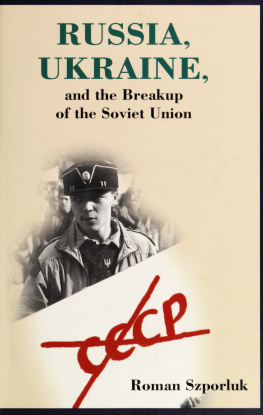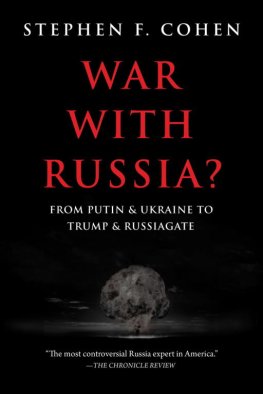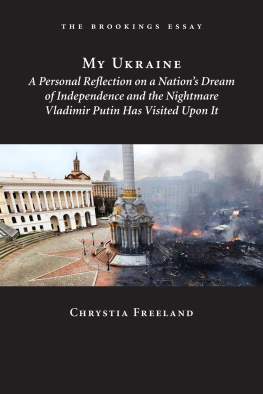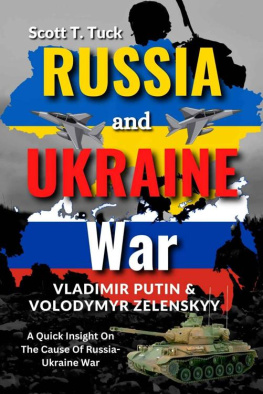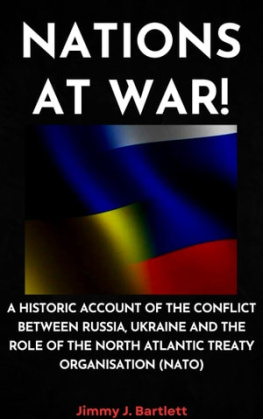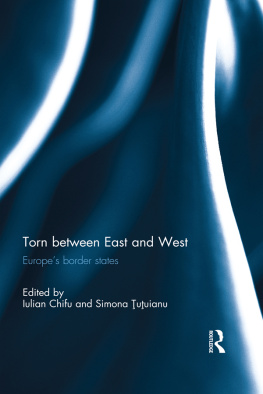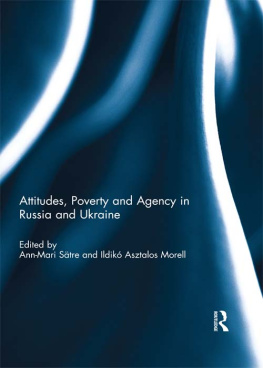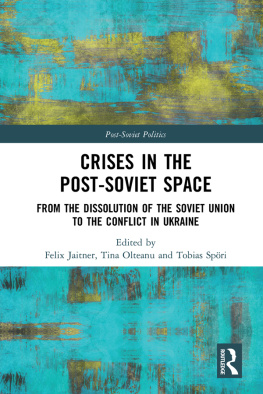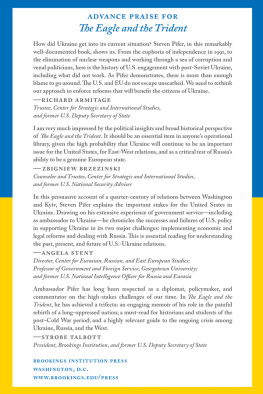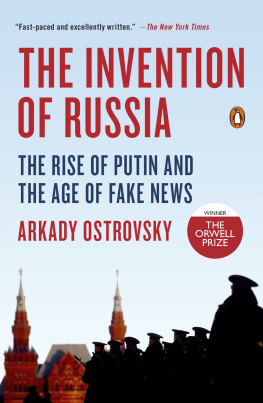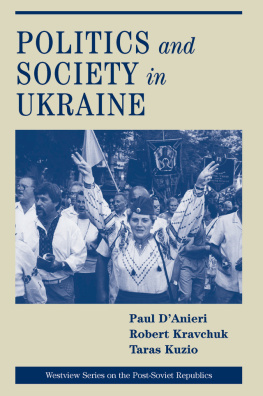Roman Szporluk - Russia, Ukraine, and the breakup of the Soviet Union
Here you can read online Roman Szporluk - Russia, Ukraine, and the breakup of the Soviet Union full text of the book (entire story) in english for free. Download pdf and epub, get meaning, cover and reviews about this ebook. year: 2000, publisher: Stanford, CA : Hoover Institution Press, genre: Politics. Description of the work, (preface) as well as reviews are available. Best literature library LitArk.com created for fans of good reading and offers a wide selection of genres:
Romance novel
Science fiction
Adventure
Detective
Science
History
Home and family
Prose
Art
Politics
Computer
Non-fiction
Religion
Business
Children
Humor
Choose a favorite category and find really read worthwhile books. Enjoy immersion in the world of imagination, feel the emotions of the characters or learn something new for yourself, make an fascinating discovery.
- Book:Russia, Ukraine, and the breakup of the Soviet Union
- Author:
- Publisher:Stanford, CA : Hoover Institution Press
- Genre:
- Year:2000
- Rating:3 / 5
- Favourites:Add to favourites
- Your mark:
- 60
- 1
- 2
- 3
- 4
- 5
Russia, Ukraine, and the breakup of the Soviet Union: summary, description and annotation
We offer to read an annotation, description, summary or preface (depends on what the author of the book "Russia, Ukraine, and the breakup of the Soviet Union" wrote himself). If you haven't found the necessary information about the book — write in the comments, we will try to find it.
Russia, Ukraine, and the breakup of the Soviet Union — read online for free the complete book (whole text) full work
Below is the text of the book, divided by pages. System saving the place of the last page read, allows you to conveniently read the book "Russia, Ukraine, and the breakup of the Soviet Union" online for free, without having to search again every time where you left off. Put a bookmark, and you can go to the page where you finished reading at any time.
Font size:
Interval:
Bookmark:

Szporluk, Roman
This book was produced in EPUB format by the Internet Archive.
The book pages were scanned and converted to EPUB format automatically. This process relies on optical character recognition, and is somewhat susceptible to errors. The book may not offer the correct reading sequence, and there may be weird characters, non-words, and incorrect guesses at structure. Some page numbers and headers or footers may remain from the scanned page. The process which identifies images might have found stray marks on the page which are not actually images from the book. The hidden page numbering which may be available to your ereader corresponds to the numbered pages in the print edition, but is not an exact match; page numbers will increment at the same rate as the corresponding print edition, but we may have started numbering before the print book's visible page numbers. The Internet Archive is working to improve the scanning process and resulting books, but in the meantime, we hope that this book will be useful to you.
The Internet Archive was founded in 1996 to build an Internet library and to promote universal access to all knowledge. The Archive's purposes include offering permanent access for researchers, historians, scholars, people with disabilities, and the general public to historical collections that exist in digital format. The Internet Archive includes texts, audio, moving images, and software as well as archived web pages, and provides specialized services for information access for the blind and other persons with disabilities.
Created with abbyy2epub (v.1.6.9)

RTTSSIA
JL k-/ JL x ^
%J Ml%..M,.I;.It 1..M ... ,5
and the Breakupof the Soviet Union
Roman Szporluk
\
BOSTON ?WVJC UWVMW$miw
Russia, Ukraine, and theBreakup of the Soviet Union
Pro-independence demonstration in Kyiv, October 1990
For my grandchildren,Marco and Sofia
Digitized by the Internet Archivein 2017 with funding fromKahle/Austin Foundation
https://archive.org/details/russiaukrainebreOOjose
Foreword Wayne S. Vucinich ix
Acknowledgments xiii
A Note on Transliteration xvii
Introduction xix
1 Nationalities and the Russian Problem in the
USSR: A Historical Outline 1
2 The Nations of the USSR in 1970 29
3 Russians in Ukraine and Problems of Ukrainian
Identity in the USSR 71
4 West Ukraine and West Belorussia: Historical
Tradition, Social Communication, and LinguisticAssimilation 109
5 Urbanization in Ukraine since the Second
World War 139
6 History and Russian Nationalism 161
Vlll
Table caption Contents
Dilemmas of Russian Nationalism | ||
The Imperial Legacy and the Soviet Nationalities V \ v Problem | ||
The Soviet Westor Far Eastern Europe? | ||
The Press and Soviet Nationalities: The PartyResolution of 1975 and Its Implementation | ||
The Strange Politics of Lviv: An Essay in Searchof an Explanation | ||
Nation-Building in Ukraine: Problems andProspects | ||
Reflections on Ukraine after 1994: The Dilemmasof Nationhood | ||
After Empire: What? | ||
IS | Ukraine: From an Imperial Periphery to aSovereign State | |
The Fall of the Tsarist Empire and the USSR: TheRussian Question and Imperial Overextension | ||
Index |
The nationalities question in the former Soviet Union (FSU) bedeviledSoviet policymakers and continues to trouble post-Soviet authorities andscholars alike, even after the dissolution of the Soviet state. Russia,Ukraine, and other former Soviet republics remain multinational states,subject to interethnic tensions and secessionist tendencies. The recentsituation in Chechnya shows that the FSU is still subject to fragmentation along national lines and underscores the urgent need to understandthese incendiary issues.
Roman Szporluk, a well-known authority on Eastern Europe, Russia, and Ukraine, has grappled for years with the questions of Sovietiza-tion, Russification, and the rise of nationalism in the Soviet Union andthe adjacent world. This volume, a selection of Professor Szporluks essays published between 1972 and 1997, tells a story crucial to understanding the dissolution of the Soviet Union and the emergence of itsfifteen successor states. Szporluk examines the historical relationship ofUkraine and Russia and the parallel processes of nation building beforeand during the Soviet period. These nascent nationalisms not only affected Ukrainian-Russian relations but ultimately played a pivotal rolein the disintegration of the Soviet Union. Most challenging to conven
X
Foreword
tional interpretations of the Soviet empires demise, however, is Szpor-luks emphasis on the role played by Eastern Europe and the SovietWest (Western Ukraine, Western Belarus, and the Baltics).
In order to understand the national question in the Soviet EJnion,one must recur to the tsarist era and imperial Russias relations withboth its minority populations and its colonial territories. Accordingto Szporluk, precisely tsaristand later, Soviet-Russias successful imperial expansion undermined Russias own attempts at nation building.The tsarist regime remained purblind to the difficulties of incorporatingterritories and peoples that were alien to Russian cultural traditions, andthe Soviet regime inherited its obtuseness. Moreover, the Soviet regime,blinkered by internationalist ideology, never came to grips with the nationalities question that their successful territorial acquisitions posed. Infact, the new Bolshevik regimes division of the Soviet state into administrative units based on ethnicity (and with the constitutional right tosecede!) was a time bomb implanted in the foundation of the Sovietstate. As Szporluk observes, however, it was the Soviet Unions greatesttriumph of legitimationits World War II victorythat instigated itsgradual decline. The postwar regime, like its predecessors, was ill-equipped to successfully integrate the newly annexed territories of WestUkraine, West Belarus, and the Baltics. Subsequently, these areas wouldbecome hotbeds of national dissent, susceptible to ideological contagion by their East European neighbors.
Szporluk addresses the challenges posed to Soviet ideological integrity by its incorporation of these western territories. Communist Partyideology held that the adoption of the Soviet system (Soviet vs. Western-style modernization) by national republics was the road to modernityand prosperity. Szporluk sees a dialectical relationship established between Russianness and communism in Stalins Russification policy: Thesuccess of Russification would impel the success of the Soviet project,and successful economic and social modernization (Sovietization) wouldfoster Russification.
The inclusion of the Baltics and West Ukraine in the Soviet Union inthe wake of World War II, and the incorporation of Eastern Europeunder the Warsaw Pact umbrella, allowed Soviet citizens to experiencethe disjuncture between ideological claims and reality. The legitimacyand stability of the Soviet Union required complete isolation, not onlyfrom the capitalist West, but from more advanced Eastern Europeannations that would provide Soviet citizens with a basis of comparison
Next pageFont size:
Interval:
Bookmark:
Similar books «Russia, Ukraine, and the breakup of the Soviet Union»
Look at similar books to Russia, Ukraine, and the breakup of the Soviet Union. We have selected literature similar in name and meaning in the hope of providing readers with more options to find new, interesting, not yet read works.
Discussion, reviews of the book Russia, Ukraine, and the breakup of the Soviet Union and just readers' own opinions. Leave your comments, write what you think about the work, its meaning or the main characters. Specify what exactly you liked and what you didn't like, and why you think so.

